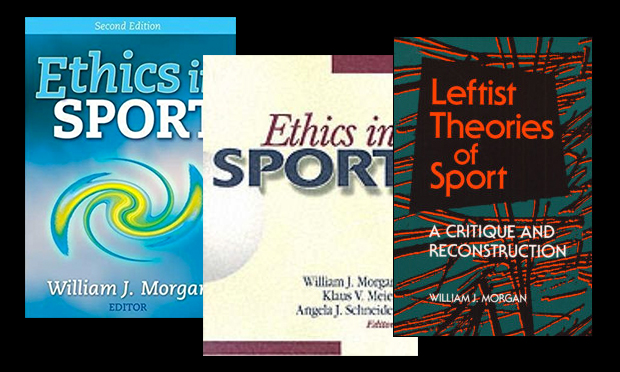Gunnar Breivik
Norwegian School of Sport Sciences

On Sport and the Philosophy of Sport: A Wittgensteinian approach
233 pages, hardcover.
Abingdon, Oxon: Routledge 2015 (Ethics and Sport)
ISBN 978-1-138-90786-7
What is sport? And what is philosophy of sport? The British philosopher Graham McFee has written an interesting book on these two central themes relating to sport philosophy. McFee is Emeritus Professor of Philosophy at Brighton University, UK and is part of the Philosophy department at California State University, Fullerton, USA. His research and lecturing interests include the aesthetics of dance and the philosophy of Wittgenstein. His publications relating to sport philosophy include books like Sport, Rules and Values (2004), Ethics, Knowledge and Truth in Sport Research (2010) and The Philosophical Aesthetics of Dance (2011).
The present book on sport and philosophy of sport is based on earlier articles and speeches but contains also new material. The book has four parts. The first part, called “Elements for a positive account of understanding sport”, discusses what sport is. How can we make sense of sport? McFee thinks that the concept of sport is a problematic one. He argues that it is not possible to give a definition of sport that covers all different sports. Sport is a concept without clear boundaries and what we calls “sport” is dependent upon circumstances and occasions. McFee is following Wittgenstein here. This means that the well-known definition presented by Bernard Suits, according to which sports are games where the goal is to overcome unnecessary obstacles according to specific rules, does not fit all activities called “sports”. Furthermore, McFee discusses whether we need to assume that sport should be best understood at its highest level, in its fully developed version, rather than as a recreational pursuit in a park. So how should we then understand sport? McFee argues for an institutional concept of sport. Sport is what counts as sport by the “sports-world”. Sport is an institution in the same way as art is an institution. What is art is defined by what the “art-world” defines as art. This type of understanding opens up for occasion-sensitivity and contextualism which are important elements in McFee’s philosophy of sport.
McFee likes to challenge the authorities and the accepted views. Suits’ definition of sport is one leading idea that he attacks, MacIntyre’s idea of sport as a human practice is another one. According to MacIntyre, and a lot of sport philosophers, sporting practices are cooperative human activities through which internal goods are realized in the course of trying to achieve those standards of excellence that are inherent in these forms of activity. This means that the goods of sports are internal to the activity and can only be reached by those following the rules. MacIntyre again problematizes this view and argues that sports builds on customs and skills that are acquired through training. Skills are acquired, practices presuppose education. Sports build on and are in many cases mindless pursuits and are not deliberate practices. Another question is whether normativity defines the practice community or the other way around. McFee seems to think that the normativity is not coextensive with the practices. Sports are not closed, but open for changes of rules and for involvement at different performance levels with different rules. In general McFee does not think that the common ideas of rules, the distinction between “constitutive” versus “regulative” rules, and so on, are informative of how sports are practiced. Similarly written and unwritten rules (ethos) apply differently in different contexts.
The second part of the book is called “Prospects for a philosophy of sport”. Here McFee argues for an even more controversial idea, namely that there is no Philosophy of Sport. One thing is the problematic definition problem of what sport is. Another more serious problem is that philosophy is a general activity that does not open up for specialized investigations of special or specific sub-areas. McFee cites Paul Grice remark “philosophy is one subject, a single discipline” (p. 87). Training in philosophy implies general training in the main areas of philosophy, like metaphysics, epistemology logic, ethics, and aesthetics. Similarly the practice of philosophy should include general questions in these main areas. Sport is only interesting when it raises questions that are general in nature, say the body-mind problem, but then it is not a question in philosophy of sport (which does not exist) but in general philosophy of mind. For McFee then, there are relatively little of interest left for a philosophy of sport. He accepts that philosophy of human movement, a broader area, could be of interest, but then it is not a philosophy of sport proper. It is in ethics and to a certain extent in aesthetics that McFee finds a place for something like a philosophy of sport.
McFee’s discussion of aesthetics follows David Best’s distinction between purposive and aesthetic sports. In purposive sports there is a purpose or goal, like scoring goals or crossing the finish line. In aesthetic sports there is no such goal. Instead there is an evaluate judgment of the aesthetic quality of the movement(s) of the performer. Even purposive sports may display aesthetic qualities, but does not depend on them. Winning may be ugly. But for many spectators the aesthetic quality plays an important role. McFeee takes up a discussion with Stephen Mumford, who in his book Watching Sport: Aesthetics, Ethics and Emotion (2012) distinguishes between “purists” and “partisans”. The partisans take side and involve themselves emotionally on one side in the game. The purists take a more distanced view and enjoy the game for its purely positive and aesthetic aspects. McFee thinks that the emotional involvement of the purists is too thin to be able to enjoy what sport is about. And enjoying purposive sports means having a wider perspective than just a look at the aesthetic qualities of such games, since they after all are (also) about winning.
McFee argues for an institutional concept of sport. Sport is what counts as sport by the “sports-world”. Sport is an institution in the same way as art is an institution. What is art is defined by what the “art-world” defines as art.In the third part of the book McFee sets out to rescue the Olympic idea. It is called “Rational reconstruction and history”. Even if the French Baron Pierre de Coubertin had many issues that the idea of Olympism was supposed to solve, the most important to Mc Fee is the idea that sport has a value in itself. Coubertin stressed the intrinsic values of sport, whereas governments typically have stressed the extrinsic values of sport, such as inspiring young people, getting people more active or develop elite achievement. McFee argues that since it is impossible to achieve the internal goals of sport without abiding by the rules, sport is inherently normative in character. Sport can be what McFee calls a moral laboratory where attitudes and actions can be tested. McFee is aware of the many failures of the Olympic movement and the development of the many extrinsic reasons (money, fame, honor etc.), but holds on to the basic insight of Coubertin and the pioneers of sport as moral education. Coubertin took the idea from Thomas Arnold and other British public school ideologists, but made the general principles of fair play and level playing field basics for the new Olympic movement. Even the idea of amateurism, which has received a lot of critique, can according to McFee be rationally reconstructed to something useful. McFee thus tries in a sense to save the original and basic Olympic idea of sport as a value in itself and with moral educative power, while he is well aware of the sorry and problematic story of the old as well as recent Olympic movement and the Olympic Games.
The last part of the book is about “Rules, decisions and officiating”. McFee here again introduces the distinction between purposive and aesthetic sports and the different roles that the judges and the referees typically have in sport. The goal has often been to develop a general theory of officiating in sport and find general principles that could be used when officiating. Mcfee cites Russell (2004) who urges that an “obvious principle of games adjudication is that rules should be interpreted according to the principles of fairplay and sportsmanship, and so that the good conduct of games is maintained.” (p. 187). But McFee, following the Wittgensteinian tenet of his reasoning thinks that there is no need for general principles and that instead the individual sports and the different occasions and contexts need to be taken into account.
McFee’s book raises a lot of interesting and important questions. It is provocative, in the sense that it kicks the legs off a special philosophy of sport and instead leaves us with a meager menu where ethics of sport is the only main course. Aesthetics of sport is at best dessert. The idea of philosophy as a unitary subject area and the concept of sport as a Wittgensteininan family-type concept are both disputable. Personally I agree with McFee about the concept of sport. I think it is fruitful to look at it as a concept with grey border areas and with different members, different types of sport that are similar to each other in different ways. When it comes to the problem of the existence or non-existence of a philosophy of sport I disagree with Mcfee. I think philosophy is not a unitary area, but can like sport be said to have different members. Philosophy of movement and philosophy of sport are such members. They use philosophical ideas, philosophical methodology and philosophical problems to throw light on relevant sport phenomena and hopefully some light will reflect back on general philosophical discussions. Why should sport be a family-concept while philosophy is not?
The institutional anchoring of philosophy of sport is diverse. McFee is a general philosopher, like Mumford and other sport philosophers, holding positions at universities in general philosophy departments. Mcfee typically asks whether a specific field like sport has a place in general philosophy. He answers: No! But sport philosophers also come from specialized sport schools at university level, or from sports or kinesiology departments at universities and other higher education institutions. They have training in philosophy and they see a need for a philosophy of sport as a general perspective on sports that sport psychology, sport sociology, are sports history are not able to offer. Philosophy represents the general theoretical perspective that is needed to discuss ethics, aesthetics, epistemology, ontology relating to the phenomenon of sport. Here the extreme analytical approach, represented by McFee gives one perspective. But other perspectives from the Continental tradition, like hermeneutics, phenomenology, and critical theory are also needed.
In conclusion I think McFee’s book is thought-provoking, interesting, and well argued. It is at some points difficult and demanding for the reader, but it is worthwhile to follow McFee through. He has important insights and arguments that should be debated, and opposed, by sports philosophers in the near future. Otherwise philosophy of sport may be dead.
Copyright © Gunnar Breivik 2016
References







